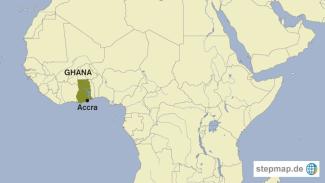Migration
The stigma of failure
 stepmap.de
stepmap.de
About 500 people have gathered under the trees in a park in Tamale. They meet here every week, after having returned from Libya. Umar Mashood is among them. Like many of his friends, Umar regrets having tried to migrate: “I went abroad for money, but I didn’t get any. I only suffered and had to come back.”
Mawiya Issah expresses similar regrets about travelling to Libya. The 45-year-old man says: “From Libya, I didn’t manage to get to Europe. But if I look at my mates, those who stayed here, they have jobs now.” He says that those who stayed made the effort to learn and acquire the knowledge they needed, and that he should have done that too.
Those who come home with empty hands must now live with the stigma of failure. It makes life even harder for them. As Umar puts it, “the community doesn’t trust us.”
Oil-rich Libya used to be a good place for African migrants to work, but many migrants were forced to return to their countries of origin after the Arab spring uprising in 2011. Some tired to tried to move on to Europe, but Umar went back to Ghana. “My family was happy that I returned alive and safe, but they complained that I came home without money,” he says. People like himself are considered “failures”, according to Umar. “As a returnee from Libya, you are no better than a criminal.”
Irregular migration is a common phenomenon in northern Ghana. Families encourage their sons to migrate, hoping to get remittances.
The returned migrants have found a new mission. They want to keep others from embarking on a fruitless journey. “We want to go to schools to educate the students, also to lorry stations and other places in order to tell people what migration is really like,” says one of the returnees.
According to Ghanaian media reports, nearly 4000 Ghanaians travelled to Libya in 2015 hoping to get to Europe. Between January and April last year, 471 Ghanaians, including 32 unaccompanied minors, were rescued by Italian authorities from boats in the Mediterranean Sea. Such figures are worrying, and former migrants in Tamal hope to make a difference.
In the meantime, Ghana’s the government has recently formulated the first ever national migration policy. The document states that people can reduce poverty through migration, but it does not consider migration a one-way street, pointing out that the “return migration of Ghanaian professionals and semi-skilled migrants is on the increase”.
Maxwell Suuk is a journalist and lives in northern Ghana.
suuk.max@gmail.com

